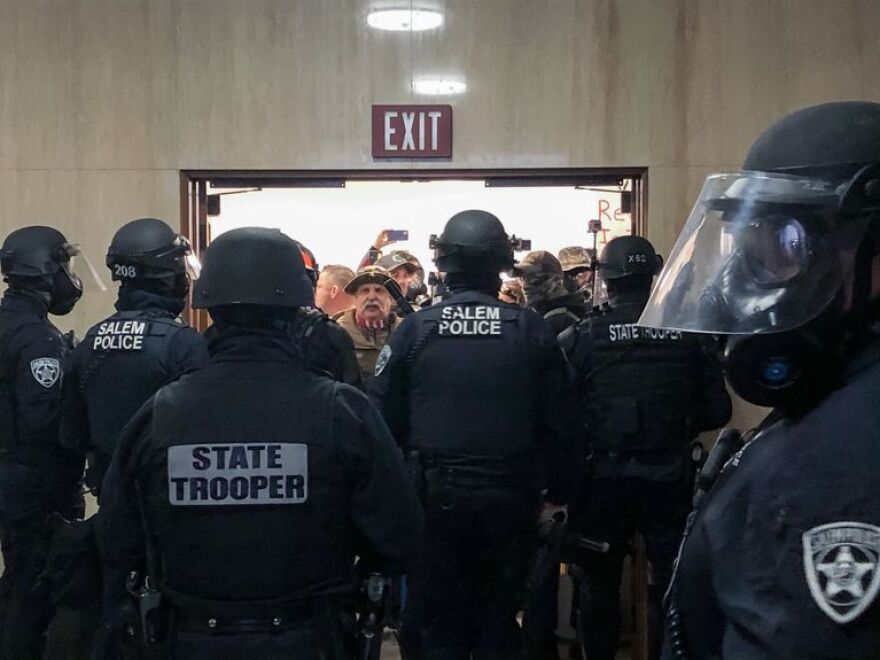I think it’s fair to say that any journalist worthy of the name takes this very seriously. How to do that, however, is far from cut and dried.
One recent example … When violence broke out at the U.S. Capitol on Jan. 6, news organizations weren’t sure how to accurately and fairly label what was happening. Once hundreds of screaming people fought through police lines and smashed their way into the Capitol building, intent on stopping the official count of the Electoral College votes cast in the presidential election, “protesters” no longer seemed adequate. “Rioters” seemed closer to the mark, but most riots are aimlessly destructive, people smashing, looting or burning in frustration and opportunism, but rarely with real focus or purpose. This crew definitely had an agenda.
Did those acts of arson and vandalism invalidate the non-violent dissent of the large majority of those demonstrators?
On a Facebook page for public media journalists, there was an impromptu discussion. What terms were different stations using? Coup? Sedition? Terrorism? At one point, NPR reporter Lulu Garcia-Navarro tweeted that NPR had landed on calling the rioters “pro-Trump extremists” who were engaged in “insurrection.” Here at JPR, that seemed to hit the right note.
Another example: Two weeks earlier—and closer to home—JPR news got an angry email from a listener (How angry? The subject line was “Lies, Lies, Lies!”). We had posted online coverage, from Oregon Public Broadcasting, of a protest which had turned violent at the Oregon State Capitol in Salem. The group Patriot Prayer was prominently represented, as were some armed “militia” types.
The legislature was meeting in special session. Several hundred protesters called for ending the state’s pandemic restrictions. Dozens forced their way into the Capitol. According to OPB reporters on the scene…”the Oregon State Police declared an unlawful assembly as a growing number of protesters pushed their way through the Capitol doors chanting, “let us in” and “arrest Kate Brown.” Police officers donned gas masks as they squared off with protesters, some of whom carried firearms and bear spray, and many of whom were not wearing [face]masks.”
Videos posted to Twitter showed glass doors being smashed, police being sprayed with bear mace and at least two journalists being assaulted.
Our irate listener was at the Capitol in Salem that day. The source of his anger was the headline on the story: Far-Right Protesters Disrupt Oregon Legislature Special Session.
“I was among the peaceful protesters demanding to enter the UNLAWFUL closed session of our legislature this morning,” he wrote. “I am not a ‘far right protester’ as your article explains in this false report!”
He and his compatriots, he explained, were “normal everyday citizens … really concerned about the avenue our government is taking … I was, and am, very concerned about the future tenor of these protests if ‘we the people’ are not listened to by our increasingly tyrannical government.”
Since I take the power of words seriously, when someone accuses my newsroom of misusing our words, I take that to heart. Was the “far-right protesters” descriptor inaccurate or unfair, as our listener believed?
As for many of these questions, the answer is neither simple nor clear. Certainly, this was not just a “peaceful protest,” as our listener claimed. Forcing your way past police officers into the state Capitol is not “peaceful” protest. Spraying police with bear mace is not “peaceful” protest. There is no need to carry firearms during a “peaceful” protest. Pretty much by definition, anything attended by Patriot Prayer is not a “peaceful” protest, because they almost invariably seek out opportunities to brawl with opponents.
Our listener would probably say he himself hadn’t done any of those things, and I’d have no reason to doubt that. And he could correctly point to a number of racial justice protests around the country last summer where some in the crowd had looted and torched businesses. Did those acts of arson and vandalism invalidate the non-violent dissent of the large majority of those demonstrators? I would say not, as did most of those reporting on those events. So, what’s the difference?
Well, one difference is that the violence that occurred at some of the Black Lives Matter protests was committed by off-shoots from the main body of demonstrators. At the Oregon Capitol—as at the U.S. Capitol two weeks later—the crowd forcing their way inside was the main event.
But for me, the takeaway is that ascribing motives or viewpoints to large groups of people can be problematic. When you have well-known far-right groups such as Patriot Prayer or Oath Keepers at a demonstration—especially if they take a prominent part in the event—it’s certainly not incorrect to describe them as far-right. Whether everyone at that demonstration can be accurately tagged with that label is another matter.
So, while I think our angry listener is being a bit disingenuous by being unwilling to concede the overall tenor of the violence in Salem on Dec. 21, the point -- that it’s usually more accurate to describe observable actions than to label and ascribe motives—is well taken.
It’s one I’ll keep in mind as we continue to cover events like this going forward, because this type of civil unrest shows no signs of going away anytime soon.




